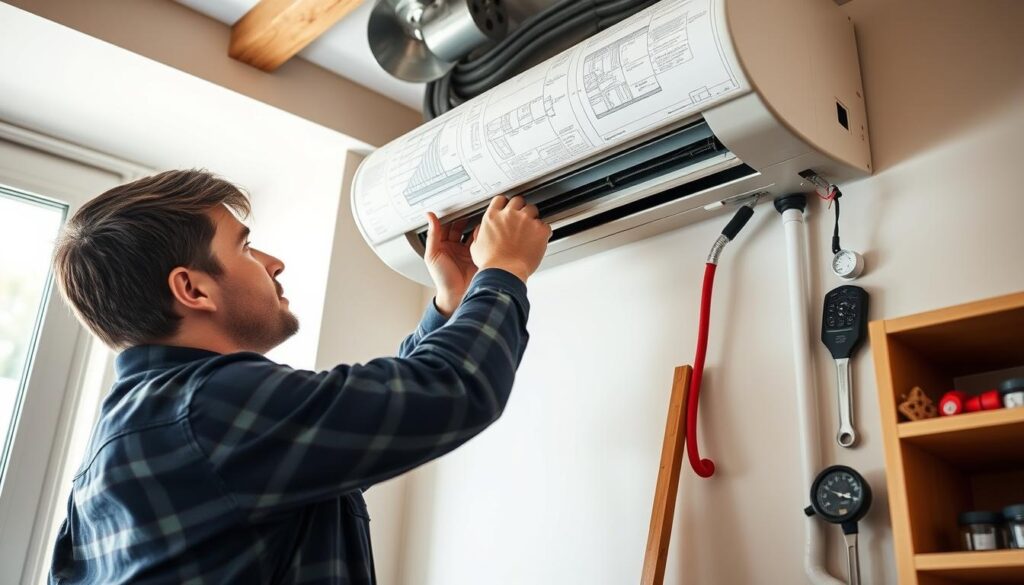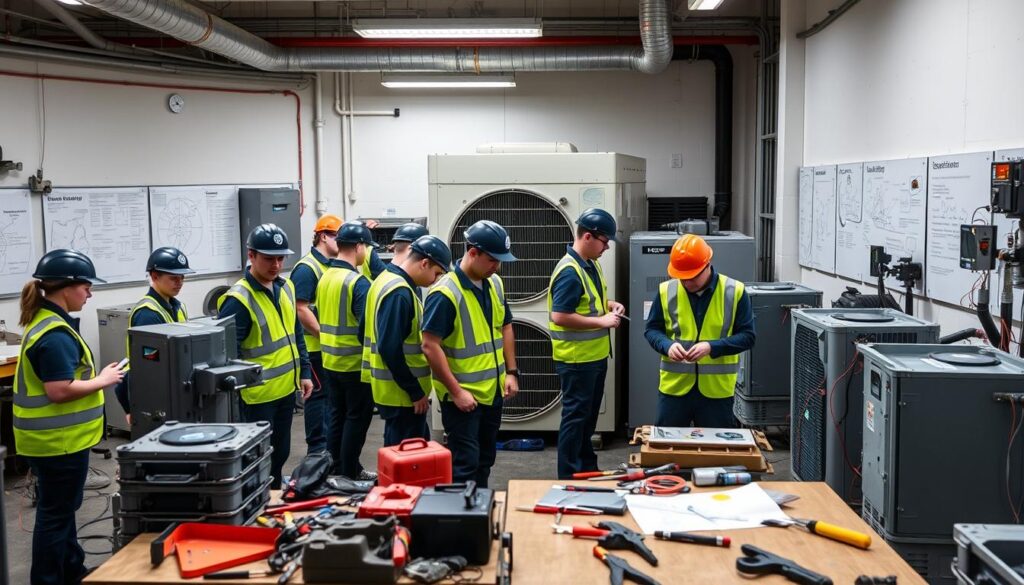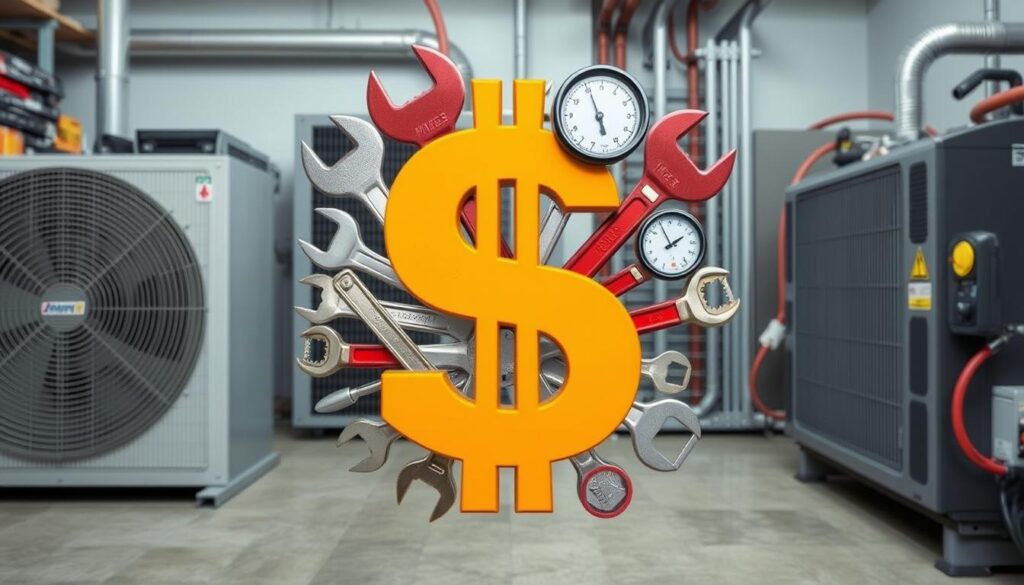Affiliate Disclosure
HVAC Guide Guys is a participant in the Amazon Services LLC Associates Program, an affiliate advertising program designed to provide a means for sites to earn advertising fees by advertising and linking to Amazon.
Are you thinking about a career in HVAC? You might wonder if you need a college degree to do well. The truth is, while college can help, it’s not always needed to become a top HVAC technician.
Let’s dive into the HVAC world. We’ll look at different ways to get into this exciting field. You’ll see that there are many paths to a fulfilling HVAC career.

Key Takeaways
- HVAC technicians made a median annual salary of $50,590 as of May 2020, with the top 10% earning more than $80,820 per year.
- The HVAC industry is projected to grow by 5% between 2020-2030, adding over 38,500 new jobs.
- HVAC technician training can take 6-24 months and lead to a certificate or an associate degree.
- HVAC technicians can earn a certificate in as little as 9-10 months or complete a 2-year associate degree program.
- Apprenticeships for HVAC technicians typically last 3-5 years and combine classroom instruction with hands-on training.
Table of Contents
Understanding the HVAC Industry Landscape
The HVAC (Heating, Ventilation, and Air Conditioning) industry is booming. There’s a big push for energy-saving systems and better climate control. This makes the job outlook for HVAC techs look good.
The Bureau of Labor Statistics says the field will grow by 5% from 2020 to 2030. This means over 38,500 new jobs will be added.
Industry Evolution and Technological Advances
The HVAC industry has changed a lot thanks to new tech. Today’s systems use computer controls, smart home tech, and save energy. HVAC techs need to know a lot about computer science, physics, and math to keep up.
Role of Modern HVAC Technicians
HVAC techs do more than just fix things. They read blueprints, connect wires, test circuits, and weld pipes. They also need to know about designing, installing, maintaining, and fixing systems to make sure they work well and save energy.
Current Market Demand and Growth
The HVAC industry is in high demand. This is because of extreme weather and the need for energy-efficient systems. People and businesses want HVAC techs to install, keep up, and fix their systems.
This demand makes HVAC a great career choice. It’s a field that’s growing and offers many opportunities.
“The HVAC industry is evolving rapidly, and modern technicians must be equipped with a diverse skill set to meet the demands of this dynamic field.”
Do I Need College For HVAC
Getting a college degree isn’t a must for an HVAC career. Yet, some post-secondary education or training is usually needed. Many states require HVAC technicians to be licensed. This means they must finish an accredited trade program, get work experience, and pass an exam.
Some technicians might want to get associate’s or bachelor’s degrees for better job chances. But, it’s not a must to start working in HVAC.
Those who get post-secondary HVAC training often make more money and have less unemployment than high school graduates. For instance, HVAC techs with training can earn up to $200,000 more over their careers. The starting salary for Refrigeration Technologies graduates in 2017-2018 was $33,488.
Just earning $5 more an hour for 35 years can mean an extra $1.76 million. Having HVAC training also helps when looking for jobs. More employers want people with this skill. Big HVAC companies hire more than small ones, and trade schools can get you a degree in about 6 months.
| Statistic | Value |
|---|---|
| Annual mean wage for Heating, Air Conditioning, and Refrigeration Mechanics and Installers in the Phoenix area (May 2018) | $46,710 |
| Average starting salary for Refrigeration Technologies RSI graduates (7/1/17 – 6/30/18) | $33,488 |
| Additional earnings over a 35-year career by earning $5 more per hour | $1,760,000 |
Even though a college degree isn’t needed for an hvac career path without college, you still need post-secondary hvac education requirements to be a licensed HVAC tech. You can get the needed training through trade schools, apprenticeships, or certificate courses. These programs help you start and grow in this sought-after field.
Explore Our HVAC Shop
Looking for top-rated HVAC tools, parts, and accessories? Visit our shop and find the perfect solution for your needs.
Visit the ShopEssential Educational Requirements for HVAC Careers
To start an HVAC career, you need a high school diploma or GED. But, to really succeed, hvac education options beyond high school are key. Technical schools and community colleges have hvac certification programs and hvac technical schools. These programs teach the skills and knowledge needed to excel in HVAC.
High School Diploma Prerequisites
A high school diploma or GED is the starting point. Courses in computer science, physics, math, and shop classes are also helpful. They build the technical skills and problem-solving abilities needed for HVAC technicians.
Technical School Options
- HVAC certificate programs, lasting 9-10 months, cover motors, refrigeration, and safety.
- Associate degree programs in HVAC, up to two years, prepare for more responsibilities.
Certification Programs Available
Hvac certification programs offer specialized training and credentials. These can include EPA, NATE, and manufacturer-specific certifications. They boost your marketability and career prospects.
| Certification | Description | Benefits |
|---|---|---|
| EPA Certification | EPA certification is needed for safe and legal handling of refrigerants. | Shows compliance with environmental laws and lets technicians work on air conditioning systems. |
| NATE Certification | NATE certification is a voluntary credential that verifies a technician’s skills. | Increases job chances, shows expertise, and can raise earning potential. |
| Manufacturer-Specific Certifications | These certifications cover specific brands and systems. | Teaches in-depth knowledge of certain brands, making technicians valuable to employers. |
With a solid education, technical training, and certifications, HVAC professionals can have a fulfilling career. This combination sets them up for success in the HVAC field.
Explore Our HVAC Shop
Looking for top-rated HVAC tools, parts, and accessories? Visit our shop and find the perfect solution for your needs.
Visit the ShopHVAC Training Program Components
Starting a career in HVAC (Heating, Ventilation, and Air Conditioning) needs thorough training. HVAC programs mix hvac program curriculum classroom lessons with hands-on practice. This combo gets students ready for the HVAC field.
HVAC training covers key areas like electrical concepts, refrigeration, and HVAC system design. Students also learn about energy efficiency and safety. Depending on the program, they might dive into commercial refrigeration, solar panels, or HVAC system testing.
Hands-on training is a big plus in HVAC programs. Students get to work with real HVAC equipment. This helps them learn to troubleshoot and solve problems, skills vital for their future careers.
| HVAC Training Program Components | Description |
|---|---|
| Electrical Concepts | Understanding electrical theory, wiring, and control systems |
| Refrigeration Principles | Learning the fundamentals of refrigeration, including refrigerants and compressors |
| HVAC System Design | Studying the design and installation of HVAC systems for residential and commercial applications |
| Energy Efficiency | Exploring ways to improve HVAC system efficiency and reduce energy consumption |
| Safety Procedures | Mastering safety protocols, equipment handling, and personal protective equipment (PPE) |
By finishing a detailed hvac program curriculum, future HVAC technicians gain crucial hvac technical skills and practical experience. This sets them up for success in the fast-paced HVAC industry.
Career Paths in HVAC Technology
HVAC, or Heating, Ventilation, and Air Conditioning, has many career paths for skilled technicians. Whether you’re new or looking to grow, there’s a lot to explore.
Entry-Level Positions
Starting out, HVAC workers often start as apprentices. They help experienced technicians with tasks like installation and repair. This role gives you hands-on training and valuable experience.
You need a high school diploma and technical training to start. You can earn about $22.47 an hour on average.
Advanced Career Opportunities
With more experience, HVAC technicians can move up. Mid-level roles, needing 3-6 years of experience and HVAC certifications, pay around $32.83 an hour. Senior roles, like contractors or project managers, require over 7 years of experience and pay more.
Specialization Options
| Specialization | Description |
|---|---|
| Commercial Refrigeration | Maintaining and repairing HVAC systems in commercial settings, such as grocery stores and restaurants. |
| Solar Thermal Systems | Designing, installing, and servicing HVAC systems that utilize renewable solar energy. |
| Healthcare HVAC | Ensuring HVAC systems in hospitals, clinics, and other medical facilities meet stringent air quality standards. |
HVAC specializations can lead to new career paths and higher pay. By focusing on specific areas, technicians become more valuable to employers.
The HVAC industry offers many chances for growth and specialization. Whether you’re starting or looking to advance, there are many paths to explore and grow in this dynamic field.
Explore Our HVAC Shop
Looking for top-rated HVAC tools, parts, and accessories? Visit our shop and find the perfect solution for your needs.
Visit the ShopApprenticeship Opportunities and Benefits
For those looking to start a career in HVAC, apprenticeships are a great choice. These programs mix on-the-job hvac training with classroom learning, lasting 3-5 years. They are often backed by unions or contractor groups, letting apprentices earn while they learn from pros.
HVAC hvac apprenticeships come with many perks. Apprentices get real-world experience, working with skilled techs. They learn both the practical and theoretical sides of the trade. After finishing, they might get a job right away, making the transition smooth.
Finding paid hvac training is easy through the United States Department of Labor’s Partner Finder. It lists all registered apprenticeships. With over 100 jobs in Minnesota offering apprenticeships, there’s plenty of room for HVAC techs to start their careers.
| Apprenticeship Program Details | Benefits |
|---|---|
|
|
Apprenticeships are a great way to start or switch to a HVAC career. They blend theory and practice, giving you a solid education. This sets you up for a rewarding career in HVAC.

Required Certifications and Licenses
To work as an HVAC technician, you need several certifications and licenses. The EPA Section 608 Certification is key. It’s needed by the Environmental Protection Agency (EPA) for refrigerant handling. This ensures HVAC pros handle and dispose of refrigerants safely for the environment.
Licensing for HVAC techs varies by state and local rules. Many states require a state-issued license. This license often needs education, experience, and passing a test. Some areas also have their own HVAC certification programs.
Additional Professional Certifications
Many HVAC techs get extra certifications like those from North American Technician Excellence (NATE). These certifications show their skills and can help them earn more.
| State | HVAC Licensing Requirements |
|---|---|
| Alabama | HVAC contractors must have held an apprenticeship certificate or show proof of at least 3,000 hours of work experience. The initial certification process includes a fee and a $15,000 performance bond. |
| Alaska | Alaska offers multiple types of HVAC-related categories under the Mechanical Administrator license with varying requirements in terms of experience and qualifications. |
| Arizona | Arizona mandates four years of experience in the HVAC specialty, or two years of experience plus graduation from a course or apprenticeship to qualify for an HVAC contractor license. Additionally, proof of workers’ compensation insurance and a cash or surety bond are necessary. |
Getting the right certifications and licenses is key for HVAC techs. It lets them work legally and safely. Knowing and meeting these standards is vital for a good HVAC career.
Skills and Competencies Development
To be a top HVAC (Heating, Ventilation, and Air Conditioning) technician, you need both technical and soft skills. These are key for success in the fast-paced HVAC world. They help you give great service to your customers.
Technical Skills for HVAC Professionals
HVAC techs must know a lot about electrical systems and mechanics. They also need to be good with diagnostic tools. They should be able to find and fix problems, and keep HVAC systems running smoothly.
It’s important for them to keep up with new tech and rules in the field.
Soft Skills for HVAC Professionals
But it’s not just about knowing how things work. HVAC techs also need to be great with people, solve problems, and manage their time well. These skills help them talk to customers, deal with surprises, and get things done on time.
Ongoing Professional Development
For HVAC techs, learning never stops. They should go to training, get certifications, and keep up with new trends and laws. This helps them grow in their career and earn more.
“The HVAC industry is constantly evolving, and it’s essential for technicians to stay ahead of the curve by continuously developing their skills and knowledge,” says Lester Mclaughlin, a seasoned HVAC professional with over 15 years of experience.
By working on hvac technical skills, hvac soft skills, and always learning, HVAC techs can thrive in this exciting field.
Explore Our HVAC Shop
Looking for top-rated HVAC tools, parts, and accessories? Visit our shop and find the perfect solution for your needs.
Visit the ShopSalary Expectations and Job Outlook
Are you thinking about a career in HVAC? You might wonder about the pay and job chances. The HVAC salary range and job market look very good.
The U.S. Bureau of Labor Statistics (BLS) says HVAC technicians made a median of $51,390 in May 2022. But, pay can change a lot. It depends on your experience, what you specialize in, and where you work. New HVAC techs might earn less than $36,170. But, more experienced ones could make over $82,630 a year.
The HVAC job market is set to grow steadily. The BLS predicts a 6% growth rate for HVAC jobs over the next nine years. This means there will be about 37,700 new HVAC jobs every year, on average, until 2032.
Some places like Texas, New York, and California will see even bigger HVAC career growth. They expect to grow by 21%, 20%, and 14% respectively over the next decade. This shows that the need for skilled HVAC techs is high and will keep growing.
In summary, the HVAC salary range and job outlook are very attractive. It’s a career that’s hands-on, tech-driven, and offers lots of chances to grow and specialize.

Alternative Educational Pathways
There are many ways to get into the HVAC field besides traditional programs and apprenticeships. Self-study HVAC courses, online classes, and short-term training can teach you the basics quickly. These options are great for those who want to start their HVAC career fast.
These alternative paths focus on practical skills rather than a lot of theory. You can finish them in months, not years. This is good for people who want to start working sooner.
But, these paths might not meet all licensing or certification needs in some places. Before starting, check what’s needed in your area for HVAC jobs.
Other Manufacturing and Machining Alternatives
There are also other paths for those interested in skilled trades, like manufacturing and machining. You can learn about metrology, CNC machining, robotics, and computer-aided design (CAD). These skills can lead to jobs in many areas of manufacturing.
These paths usually end in certificates or associate’s degrees that take 5 months to 2 years. They might not directly lead to HVAC jobs. But, they give you technical skills and problem-solving abilities that many industries value.
Choosing between traditional HVAC training and alternative paths depends on your goals and what you prefer. By looking at all options, you can find the best way to start your HVAC career.
Explore Our HVAC Shop
Looking for top-rated HVAC tools, parts, and accessories? Visit our shop and find the perfect solution for your needs.
Visit the ShopTime and Financial Investment Comparison
Thinking about a career in HVAC? It’s key to know the time and money needed for different paths. The cost and length of HVAC training vary a lot, based on your chosen program.
Certificate programs are often the cheapest, with prices from $1,200 to $15,000 and lasting 6 to 12 months. They give you direct, hands-on training for starting HVAC jobs.
Associate degree programs at community colleges or tech schools cost $15,000 to $35,000 and take up to two years. These programs include more classes, like general education, and can open doors to better jobs.
Apprenticeships are another good choice, where you learn and earn at the same time. They last 3 to 5 years and mix work experience with classroom learning. Apprenticeships usually cost less because you get paid while you train.
When looking at the ROI of HVAC training, think about the money you can make, job security, and career growth. HVAC mechanics and installers in the U.S. earn a median of $50,590 a year, the Bureau of Labor Statistics says. Plus, HVAC jobs are expected to grow by 5% in the next ten years, which is good news.
By considering the time, money, and career benefits, you can choose the right HVAC education for your goals and budget.
Conclusion
The HVAC industry is booming, with lots of job openings and good pay. While you don’t always need a college degree, some education is usually needed. It’s important to think about your education options carefully.
These options include vocational programs, apprenticeships, and certifications. They help you find the right path for your career goals.
The hvac industry future is looking good. New technology and a focus on saving energy mean more jobs for skilled HVAC workers. By choosing the right hvac education decisions, you can set yourself up for success.
There are many ways to get started in the HVAC field. You could go to a trade school, do an apprenticeship, or get a mix of training and certifications. The HVAC industry offers lots of chances for those who are willing to learn and work hard.
With the right preparation, you can start a rewarding and well-paying career as an HVAC technician.

